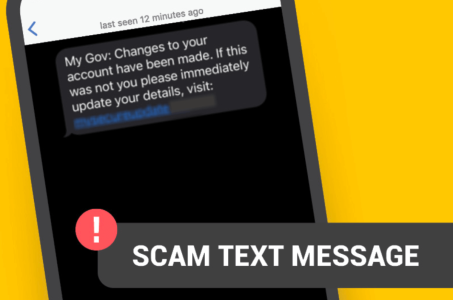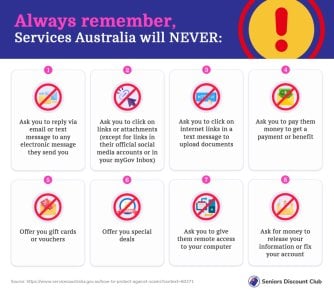New myGov security threat: Watch out for this suspicious text message
- Replies 18
In today's digital age, we rely heavily on different services and websites to manage our personal information.
However, this convenience also comes with a cost - security concerns.
Unfortunately, scammers are constantly coming up with new ways to exploit unsuspecting victims, and a recent scam targeting Aussie myGov users is a prime example.
The scam involves sending a text message that falsely claims that the user's Services Australia account has been 'breached' and their information has been altered.

The scam works by sending a text message to the victim, falsely claiming that their Services Australia account has been breached and their personal information has been changed. The message may contain alarming language that is intended to create a sense of urgency and panic in the recipient.
The scammer may then instruct the victim to click on a link or fill out a web form to 'verify' the alleged unauthorised access to their myGov account. This is a ploy to gain the victim's trust and steal their personal information and banking details.
Once the victim clicks on the link or fills out the web form, the scammer can gain access to their personal information and potentially use it for malicious purposes. This could include stealing the victim's identity, draining their bank account, or accessing other sensitive information.
It's important to remember that Services Australia will never ask for your personal information or banking details via text message or email. If you receive a suspicious message, do not click on any links or provide any personal information.
Instead, contact Services Australia directly to verify the authenticity of the message.

Services Australia has specific guidelines for how they communicate with individuals, and there are some ways to tell if the message is really from them.
If you receive an email or text message from them, it may include important information such as appointment requests or reminders, payment notifications, or confirmation of changes to your details. They may also notify you of a new message in your myGov Inbox.
If you owe money to Services Australia, they will send a letter to your preferred method of communication, whether it's your myGov Inbox, the Express Plus Centrelink mobile app, or via mail.
It's important to be aware of the methods of communication that Services Australia uses, so you can be vigilant about any suspicious messages you receive.
If you receive a letter from Services Australia and you are not sure if it is legitimate, you can call the Scams and Identity Theft Helpdesk at 1800 941 126 or email them at [email protected]. They will be able to assist you in determining whether the letter is genuine or a potential scam.
If you receive a suspicious email or text message that claims to be from Services Australia, there are some important steps you should take.
Firstly, do not open the message, click on any links or respond to the sender. Doing any of these things could compromise your personal information and potentially lead to identity theft.
Instead, you should report the suspicious message to Services Australia immediately. This will allow them to investigate the matter and potentially prevent others from falling victim to the same scam.
Finally, delete the message from your inbox to prevent any accidental access to the links or attachments.
By taking these precautions and staying vigilant, you can help protect yourself and your personal information from online scams and cyber threats. Remember, it's always better to err on the side of caution when it comes to your personal information and security.
If you want more information and advice on how to protect yourself and your accounts from scams, you can watch the video below. This video provides useful tips and guidelines on how to identify and avoid common online scams, including those targeting Services Australia and myGov users.
Credit: Services Australia.
We hope this article has provided you with helpful information and insights into how to protect yourself from scams.
In today's digital age, cybercriminals are becoming increasingly sophisticated in their tactics, which means it's more important than ever to stay up-to-date with the latest security developments and take the necessary precautions to keep your personal information safe.
If you're interested in learning more about online scams and cyber threats, you may find these articles helpful as well. They cover various types of scams and frauds that you may not have heard about, and provide practical tips on how to protect yourself and your personal information:
What are your thoughts? If you have any additional tips or advice for staying safe online, we encourage you to share them with others in the comments section below. By working together and sharing our knowledge and experiences, we can help build a safer and more secure online community for everyone.
However, this convenience also comes with a cost - security concerns.
Unfortunately, scammers are constantly coming up with new ways to exploit unsuspecting victims, and a recent scam targeting Aussie myGov users is a prime example.
The scam involves sending a text message that falsely claims that the user's Services Australia account has been 'breached' and their information has been altered.

The scam text message may tell you to click on a link or access a web form in order to 'verify' the alleged unauthorised access to your myGov account. Credit: Unsplash/NordWood Themes.
The scam works by sending a text message to the victim, falsely claiming that their Services Australia account has been breached and their personal information has been changed. The message may contain alarming language that is intended to create a sense of urgency and panic in the recipient.
The scammer may then instruct the victim to click on a link or fill out a web form to 'verify' the alleged unauthorised access to their myGov account. This is a ploy to gain the victim's trust and steal their personal information and banking details.
Once the victim clicks on the link or fills out the web form, the scammer can gain access to their personal information and potentially use it for malicious purposes. This could include stealing the victim's identity, draining their bank account, or accessing other sensitive information.
It's important to remember that Services Australia will never ask for your personal information or banking details via text message or email. If you receive a suspicious message, do not click on any links or provide any personal information.
Instead, contact Services Australia directly to verify the authenticity of the message.

If you've received a text message about unauthorised myGov account access, it could be a scam. Credit: myGov.
Services Australia has specific guidelines for how they communicate with individuals, and there are some ways to tell if the message is really from them.
If you receive an email or text message from them, it may include important information such as appointment requests or reminders, payment notifications, or confirmation of changes to your details. They may also notify you of a new message in your myGov Inbox.
If you owe money to Services Australia, they will send a letter to your preferred method of communication, whether it's your myGov Inbox, the Express Plus Centrelink mobile app, or via mail.
It's important to be aware of the methods of communication that Services Australia uses, so you can be vigilant about any suspicious messages you receive.
If you receive a letter from Services Australia and you are not sure if it is legitimate, you can call the Scams and Identity Theft Helpdesk at 1800 941 126 or email them at [email protected]. They will be able to assist you in determining whether the letter is genuine or a potential scam.
If you receive a suspicious email or text message that claims to be from Services Australia, there are some important steps you should take.
Firstly, do not open the message, click on any links or respond to the sender. Doing any of these things could compromise your personal information and potentially lead to identity theft.
Instead, you should report the suspicious message to Services Australia immediately. This will allow them to investigate the matter and potentially prevent others from falling victim to the same scam.
Finally, delete the message from your inbox to prevent any accidental access to the links or attachments.
By taking these precautions and staying vigilant, you can help protect yourself and your personal information from online scams and cyber threats. Remember, it's always better to err on the side of caution when it comes to your personal information and security.
If you want more information and advice on how to protect yourself and your accounts from scams, you can watch the video below. This video provides useful tips and guidelines on how to identify and avoid common online scams, including those targeting Services Australia and myGov users.
Credit: Services Australia.
We hope this article has provided you with helpful information and insights into how to protect yourself from scams.
In today's digital age, cybercriminals are becoming increasingly sophisticated in their tactics, which means it's more important than ever to stay up-to-date with the latest security developments and take the necessary precautions to keep your personal information safe.
If you're interested in learning more about online scams and cyber threats, you may find these articles helpful as well. They cover various types of scams and frauds that you may not have heard about, and provide practical tips on how to protect yourself and your personal information:
What are your thoughts? If you have any additional tips or advice for staying safe online, we encourage you to share them with others in the comments section below. By working together and sharing our knowledge and experiences, we can help build a safer and more secure online community for everyone.








